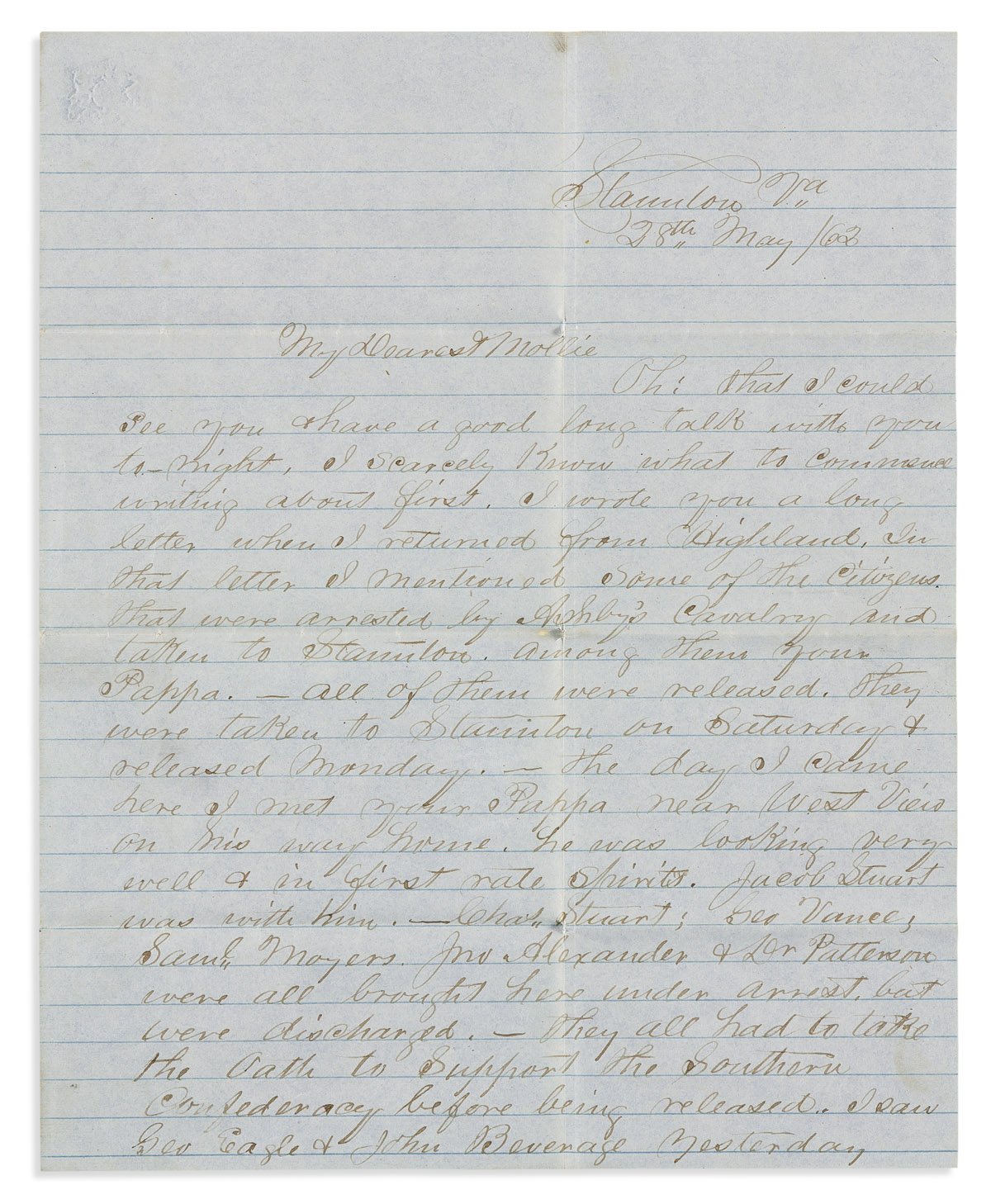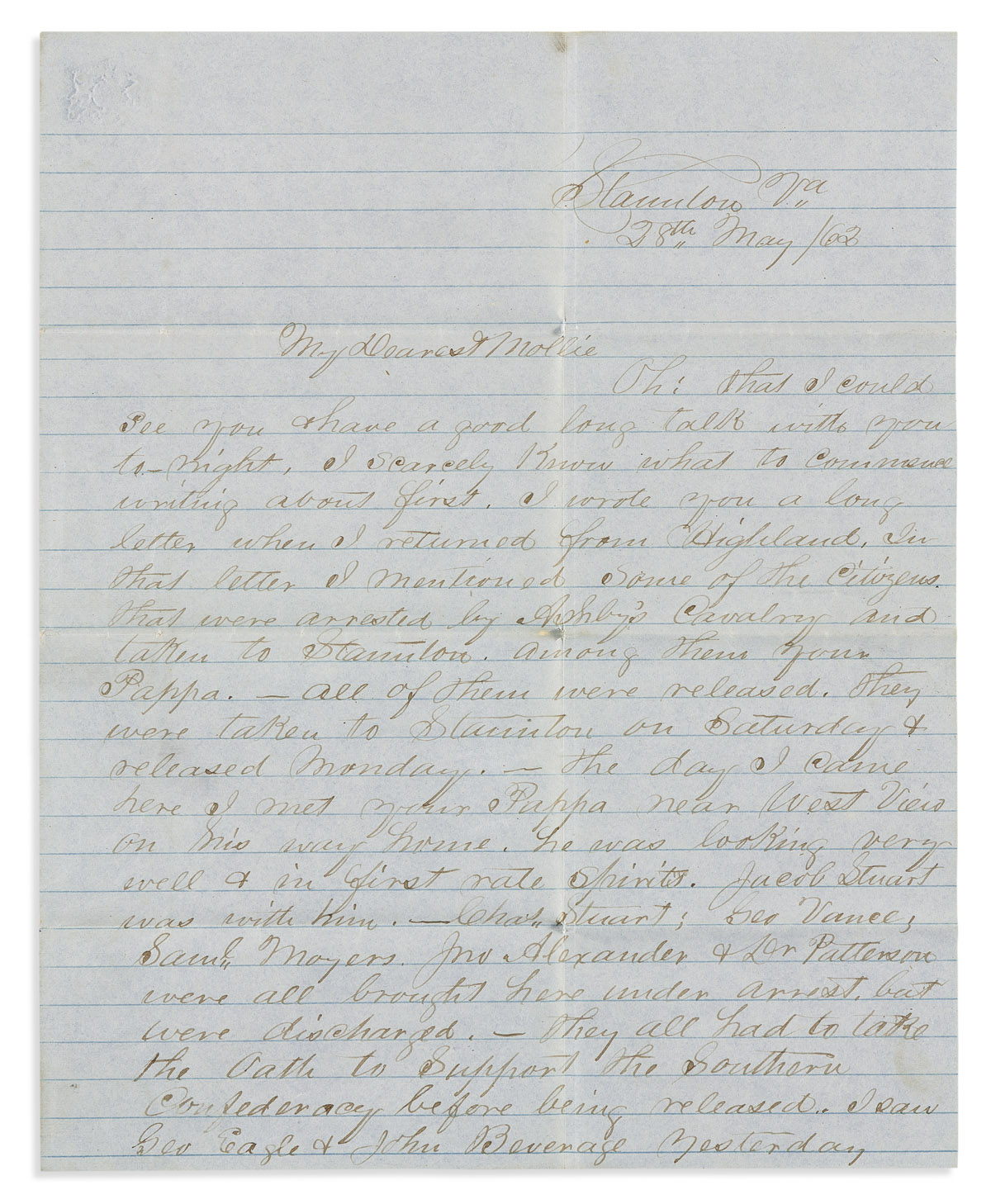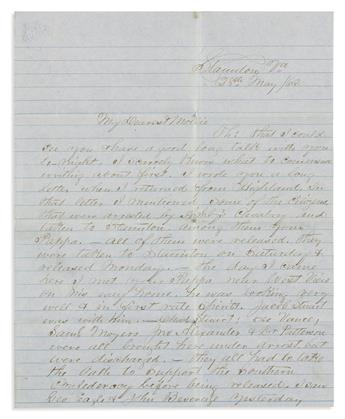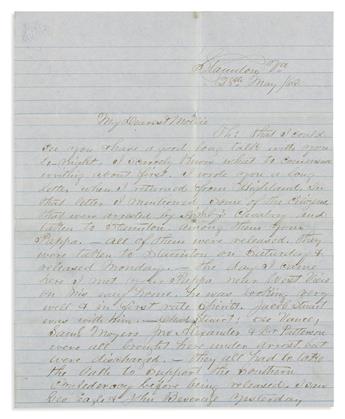Sale 2615 - Lot 63
Price Realized: $ 1,800
Price Realized: $ 2,250
?Final Price Realized includes Buyer’s Premium added to Hammer Price
Estimate: $ 800 - $ 1,200
(CIVIL WAR--CONFEDERATE.) John S. McNulty. Letters from a civilian saddler for the Confederate cavalry in the Shenandoah Valley. 7 Autograph Letters Signed as "John S." to his future wife Mollie McClung, staying with her brother in Rome, GA; mailing folds, condition generally very strong. With 4 original mailing envelopes, none with stamps but one bearing a Staunton, VA postmark. With typed transcripts. Western Virginia, May to December 1862
Additional Details
John Stevenson McNulty (1832-1915), an Irish-American saddler and postmaster from Monterey in Highland County, VA, in a remote mountainous region along the new border with West Virginia. He had a higher allegiance than to the Confederacy: he hoped to marry Mollie McClung. During the period of these letters, he avoided enlisting in the army, preferring civilian work in the quartermaster department so he could make frequent visits home.
Most of these letters were written from the major Confederate supply base at Staunton, VA, about 45 miles to the east of his home town, where he was paid $10 per day to make harnesses for the Confederate artillery in General Edward Johnson's brigade. He describes life in the Confederacy's border region. Molly's father was arrested but freed after he swore an oath to the Confederacy; a friend reported that in Highland there were "no Yankees anywhere in the county." He frequently reports on military actions in the Shenandoah region, particularly regarding Stonewall Jackson: Jackson's victory at the 25 May 1862 Battle of Winchester, and the Union cavalry's pursuit of Jackson in early June. As Jackson deployed to the Northern Virginia campaign, McNulty wrote that "the cars have been detained moveing Old Stonewall's forces from Richmond to Gordonsville" (19 July). On the day of the Battle of Cedar Mountain, McNulty wrote: "Old Stonewall has had another fight near Gordonsville" (9 August). He passes on news of the Confederate victory at Fredericksburg on 18 December 1862, boasting that the Yankees "have been sorely whipped" but bemoaning "the suffering of our homeless citizens in and around Fredericksburg."
McNulty reports on visits to Staunton's military hospital in his 3 June letter: "Oh! It is an awful pace. There is about one thousand sick & wounded & a great many dieing. In the dead room, more than once the rats have eaten out the eyes of the poor dead soldiers." On 19 July he reports on a nervous visit to Highland, where he ran into "that celebrated alarmist Jim Whitelaw, comeing at a gallop, with a dispatch for the cavalry at McDowell, & he told us that the Yankees were coming & for God sale to go back or we would be taken." McNulty ignored the advice, and the Yankees never came. On the same date, he hopes to be wed after the war: "It is uncertain when peace will be made. Perhaps not during the administration of Old Lincoln." On 9 August he reports that two Union companies from West Virginia ("Union traitors from the N.W. part of this state") have raided Highland County, burned one building, and took some local men captive: "They came very near getting the deputy sheriff of this county (John Armstrong) who was at Mrs. B's in bed. He ran out the back door & the Yanks called to him to halt & then fired on him, but he kept on running until he got to the bushes & made his escape without being hurt. . . . Most of the people out here are very much discouraged. Some think that the South will be overrun. They have begun to despair, and are already whipped."
Later in the war. McNulty became a lieutenant in the Confederate ordnance department, and married Mollie in 1865. He had a long career as a public servant in Highland County.
WITH--a letter to Mollie from her brother John H. McClung in Rome, GA, 20 January 1863, passing on wild theories: "The Yankees in forming this new state of West Virginia . . . are determined to exterminate all the population adverse to them. . . . Their plan is to steal all the Negroes, horses, cattle and imprison the whites and in many instances burn the houses. . . . If the Yankees ever get into your county again, they will make a clean sweep of Negroes and stock."
AND--a manuscript transcript of the lyrics to two Confederate marching songs by Harry McCarthy in an unknown hand, "Bonnie Blue Flag" and "The Volunteer."
Most of these letters were written from the major Confederate supply base at Staunton, VA, about 45 miles to the east of his home town, where he was paid $10 per day to make harnesses for the Confederate artillery in General Edward Johnson's brigade. He describes life in the Confederacy's border region. Molly's father was arrested but freed after he swore an oath to the Confederacy; a friend reported that in Highland there were "no Yankees anywhere in the county." He frequently reports on military actions in the Shenandoah region, particularly regarding Stonewall Jackson: Jackson's victory at the 25 May 1862 Battle of Winchester, and the Union cavalry's pursuit of Jackson in early June. As Jackson deployed to the Northern Virginia campaign, McNulty wrote that "the cars have been detained moveing Old Stonewall's forces from Richmond to Gordonsville" (19 July). On the day of the Battle of Cedar Mountain, McNulty wrote: "Old Stonewall has had another fight near Gordonsville" (9 August). He passes on news of the Confederate victory at Fredericksburg on 18 December 1862, boasting that the Yankees "have been sorely whipped" but bemoaning "the suffering of our homeless citizens in and around Fredericksburg."
McNulty reports on visits to Staunton's military hospital in his 3 June letter: "Oh! It is an awful pace. There is about one thousand sick & wounded & a great many dieing. In the dead room, more than once the rats have eaten out the eyes of the poor dead soldiers." On 19 July he reports on a nervous visit to Highland, where he ran into "that celebrated alarmist Jim Whitelaw, comeing at a gallop, with a dispatch for the cavalry at McDowell, & he told us that the Yankees were coming & for God sale to go back or we would be taken." McNulty ignored the advice, and the Yankees never came. On the same date, he hopes to be wed after the war: "It is uncertain when peace will be made. Perhaps not during the administration of Old Lincoln." On 9 August he reports that two Union companies from West Virginia ("Union traitors from the N.W. part of this state") have raided Highland County, burned one building, and took some local men captive: "They came very near getting the deputy sheriff of this county (John Armstrong) who was at Mrs. B's in bed. He ran out the back door & the Yanks called to him to halt & then fired on him, but he kept on running until he got to the bushes & made his escape without being hurt. . . . Most of the people out here are very much discouraged. Some think that the South will be overrun. They have begun to despair, and are already whipped."
Later in the war. McNulty became a lieutenant in the Confederate ordnance department, and married Mollie in 1865. He had a long career as a public servant in Highland County.
WITH--a letter to Mollie from her brother John H. McClung in Rome, GA, 20 January 1863, passing on wild theories: "The Yankees in forming this new state of West Virginia . . . are determined to exterminate all the population adverse to them. . . . Their plan is to steal all the Negroes, horses, cattle and imprison the whites and in many instances burn the houses. . . . If the Yankees ever get into your county again, they will make a clean sweep of Negroes and stock."
AND--a manuscript transcript of the lyrics to two Confederate marching songs by Harry McCarthy in an unknown hand, "Bonnie Blue Flag" and "The Volunteer."
Exhibition Hours
Exhibition Hours
Aliquam vulputate ornare congue. Vestibulum maximus, libero in placerat faucibus, risus nisl molestie massa, ut maximus metus lectus vel lorem.






